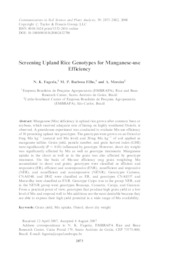Screening upland rice genotypes for manganese-use efficiency.
Screening upland rice genotypes for manganese-use efficiency.
Author(s): FAGERIA, N. K.; BARBOSA FILHO, M. P.; MOREIRA, A.
Summary: Manganese (MIi) deficiency in upland rice grown after common bean or soybean, which received adequate rate of liming on highly weathered Oxisols, is observed. A greenhouse experiment was conducted to evaluate Mn-use efficiency of 10 promising upland rice genotypes.The genotypes were grown on an Oxisol at O mg Mn kg-l (natural soil Mn leveI) and 20 mg Mn kg-l of soil applied as manganese sulfate. Grain yield, panicle number, and grain harvest index (GHI) were significantly (P < 0.01) influenced by genotype. However, shoot dry weight was significantly affected by Mn as well as genotype treatments. Manganese uptake in the shoot as well as in the grain was aIs o affected by genotype treatment. On the basis of Mn-use efficiency (mg grain weighUmg Mn accumulated in shoot and grain), genotypes were classified as efficient and responsive (ER), efficient and nonresponsive (ENR), nonefficient and responsive (NER), and nonefficient and nonresponsive (NENR). Genotypes Carisma, CNA8540, and IR42 were classified as ER, and genotypes CNA8557 and Maravilha were classified as ENR. Genotype Caipo was in the group NER, and in the NENR group were genotypes Bonança, Canastra, Caraja, and Guarani. From a practical point of view, genotypes that produce high grain yield at a low leveI of Mn and respond well to Mn additions are the most desirable because they are able to express their high yield potential in a wide range of Mn availability.
Publication year: 2008
Types of publication: Journal article
Keywords: Arroz, Arroz de terras altas, Cerrado, Magnésio, Mn uptake, Oryza Sativa, Oxisol, Solo, grain yield, shoot dry weight
Observation
Some of Embrapa's publications are published as ePub files. To read them, use or download one of the following free software options to your computer or mobile device. Android: Google Play Books; IOS: iBooks; Windows and Linux: Calibre.
Access other publications
Access the Agricultural Research Database (BDPA) to consult Embrapa's full library collection and records.
Visit Embrapa Bookstore to purchase books and other publications sold by Embrapa.

